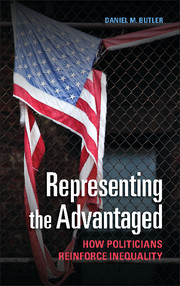Book contents
- Frontmatter
- Contents
- Acknowledgments
- 1 Representatives as the Source of Bias
- 2 When Can Representation Break Down?
- 3 Details of the Constituency Service Field Experiments
- 4 Bias in the Way Officials Process Constituents’ Opinions
- 5 Information Costs and Officials’ Proactive Effort Levels
- 6 Direct Discrimination
- 7 Bias in Politics
- References
- Index
4 - Bias in the Way Officials Process Constituents’ Opinions
Published online by Cambridge University Press: 05 August 2014
- Frontmatter
- Contents
- Acknowledgments
- 1 Representatives as the Source of Bias
- 2 When Can Representation Break Down?
- 3 Details of the Constituency Service Field Experiments
- 4 Bias in the Way Officials Process Constituents’ Opinions
- 5 Information Costs and Officials’ Proactive Effort Levels
- 6 Direct Discrimination
- 7 Bias in Politics
- References
- Index
Summary
Imagine yourself as an elected official in a city that is considering the issue of school vouchers. As part of that debate you receive the following letter advocating for the use of vouchers.
Dear Mayor,
I have lived in the community for about 10 years, working as an attorney. I am writing to ask that you support any attempt to move to a school vouchers system. Vouchers would improve the quality of education in our schools system.
Thank you for your consideration,
Best regards,
Ron Smith
Do you think the person who wrote this letter understands the complexities of the issues surrounding the use of school vouchers? Do you think the person who wrote this letter holds his position strongly? Would your answers to these questions change if the writer had been a janitor instead of an attorney?
Elected officials gather information about their constituents’ opinions and preferences during visits to their district, through opinion polls, and through the letters they receive. As officials gather this information they must decide how to weigh different constituents’ opinions. If officials feel that some groups’ opinions are less likely to be based on thorough research and/or do not represent deeply held convictions, these groups will have less influence on elected officials’ actions.
- Type
- Chapter
- Information
- Representing the AdvantagedHow Politicians Reinforce Inequality, pp. 43 - 61Publisher: Cambridge University PressPrint publication year: 2014
- 1
- Cited by



